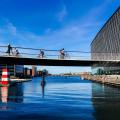
Switzerland commits to develop instruments for the sustainable management of public infrastructure and real estate.
The commitment falls under focus areas 3, 4, 8.
It is relevant to SDGs 9, 11, 12.
Partners include the Conference for the Coordination of Building and Construction Services of Public Owners (KBOB) and the Sustainable Construction Network Switzerland (NNBS).
The commitment is part of the Nicosia call 2022.

Switzerland commits to support the development of the Hydropower Sustainability Standard and its deployment in priority countries of the Swiss development cooperation. The Hydropower Sustainability Standard certification system was launched in September 2021. The support focuses on capacity development to sustainably plan, implement and operate sustainable hydropower plants in four selected priority countries (Albania, Colombia, Indonesia, and Tajikistan) and on the co-financing of sustainability assessments in priority countries of the Swiss development cooperation. It also aims to develop opportunities for climate finance investment in hydropower projects.
The commitment falls under focus areas 2, 3, 8.
It is relevant to SDG 9.
The commitment is part of the Nicosia call 2022.

Switzerland commits to strengthen the skills needed to develop and construct green buildings through a programme implemented by the International Finance Corporation (IFC).
The commitment falls under focus areas 7, 8, 9.
It is relevant to SDGs 6, 7, 9, 13.
Partners include the International Finance Corporation (IFC).
The commitment is part of the Nicosia call 2022.

Switzerland commits to set up an inter-ministerial coordination unit to support participation of Swiss companies in infrastructure projects abroad and promote the use of high sustainability standards. The coordination unit will better connect stakeholders, and, in particular, promote the use of high sustainability standards like the SuRe Standard and the upcoming Sustainable Infrastructure Label from FAST Infra, in the planification, realisation and maintenance of infrastructures.
The commitment falls under focus areas 4, 5, 7 and 8.
It is relevant to SDG 9.
Partners include the Climate Policy Initiative and Global Infrastructure Basel Foundation.
The commitment is part of the Nicosia call 2022.

Sweden commits to introduce a littering fee. Producers should take responsibility for the life cycle of their products. According to the polluter pays principle, Sweden has, as a part of the implementation of the EU’s Single Use Plastic directive, implemented a littering fee for producers.
The commitment is relevant to SDGs 11, 12, 14.
The commitment is part of the Nicosia call 2022

Sweden commits to establish the Council for Sustainable Cities with a mandate to contribute to the long-term development of sustainable cities and to support implementation of the Government's policy for sustainable urban development.
The commitment falls under focus areas 2, 3, 5, 8 and 9.
It is relevant to SDG 11.
The commitment is part of the Nicosia call 2022.

Sweden commits to take actions to improve sustainable tourism in Sweden. The strategy is a national road-map for all actors involved in promoting sustainable development in the tourism industry – such as national authorities, regional and local actors, industry representatives and research.
The commitment falls under focus areas 4, 7, 9.
It is relevant to SDGs 8, 11, 12.
The commitment is part of the Nicosia call 2022.

Sweden commits to develop sustainable urban environments by granting co-financing for municipal and regional investments in infrastructure for public transport and cycling and sustainable freight transport.
The commitment falls under focus areas 2, 4 and 8.
It is relevant to SDGs 3, 9, and 11.
The commitment is part of the Nicosia call 2022.

Serbia commits to the promotion of sustainable food waste management by implementation of the circular economy concept. The commitment falls under focus area 4.
It is relevant to SDGs 2, 12 and 13.
The commitment is part of the Nicosia call 2022.

The Regional Environmental Centre for the Caucasus (RECC) commits to supporting the South Caucasus (Armenia, Azerbaijan and Georgia) countries on promoting resource efficiency through contributing to national plans and actions, providing expertise concerning sustainable procurement and circularity; consultations and capacity building activities for engaging with tourism stakeholders.
The commitment falls under focus areas 4, 6, 7, 8 and 9.
It is relevant to SDGs 9, 11, 12.
The commitment is part of the Nicosia call 2022.
